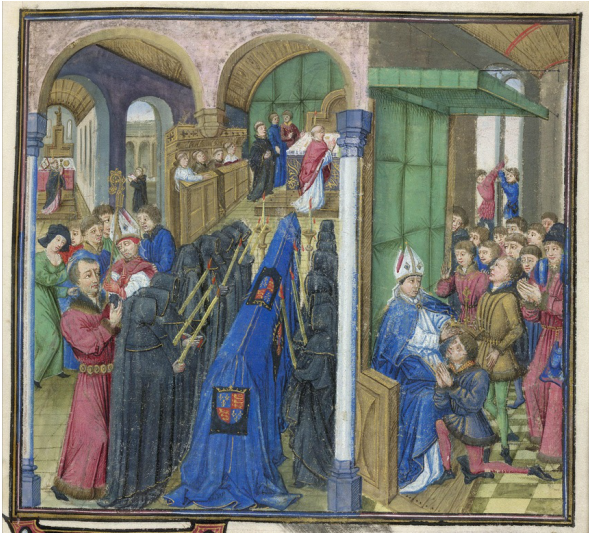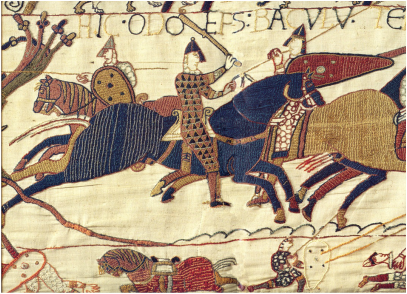The Trial of Penenden Heath: It conjures up images of King William honouring the native laws of his newly conquered land, wheeling out (quite literally) the frail Bishop Æthelric, learned in the laws and customs of the English, to espouse the old ways. The Anglo-Saxon Monk asks if we should go along with this drama ...  Grande Chronique de Normandie, British Library (Brussels, c. 1460-1468). Left, William the Conqueror's funeral; right, Archbishop Lanfranc crowning William Rufus. The Rochester version of the Trial of Penenden Heath, between Lanfranc and Bishop Odo of Bayeux, was recorded some time after William the Conqueror's death in 1089. This image is PUBLIC DOMAIN. Please click on it to go to the source.
 The Bayeux Tapestry (late 11th-century): Bishop Odo at the Battle of Hastings, club in hand (a man of God was not supposed to wield a sword). This image is PUBLIC DOMAIN. Please click on the image for details. The Bayeux Tapestry (late 11th-century): Bishop Odo at the Battle of Hastings, club in hand (a man of God was not supposed to wield a sword). This image is PUBLIC DOMAIN. Please click on the image for details. To set the scene: Odo de Bayeux was a bit of a dodgy character. Bishop, yes, but let me tell you, blessed readers, that counts for nothing! Subsequent to his half-brother’s conquering of England in 1066, he obtained rather a large amount of land in Kent as the new Earl of Kent. But, apparently, he was rather into expansionism. Now, once Lanfranc became archbishop in 1070, he had a few things to say about Odo’s land-grabbing, and argued that he had usurped Kentish lands – including land owned by Canterbury Cathedral – and as a consequence was defrauding the Church! Oh the horror! Now it has been argued that Odo was only succeeding to encroachments of land gained previously by Earl Godwine (father of the unfortunate Harold, of Bayeux Tapestry fame). But as far as I’m concerned, beloved, if you’re a decent bloke, you hand back what rightfully belongs to another! Well, what a to-do! To settle the squabble, William invites all and sundry to this big hearing at Penenden Heath (in modern-day Maidstone), a site that had long been used for shire moots (regional assemblies where cases were heard). What was decided there, William ordered, was to be the final word on the matter! Now the outcome of the three day trial (I hope they had enough mead at Penenden) was emphatically in favour of Lanfranc. Odo was ordered to return the lands in question. And, according to the Rochester version of events (it’s found in two Rochester Cathedral manuscripts, including Textus Roffensis), Lanfranc’s Canterbury ended up with a few extras, a number of exceptional exemptions from royal jurisdiction. The most significant of these related to crimes committed on the king’s highway. What that meant, in effect, was that if a murderer killed someone (let’s say a Frenchman) on the royal routes that passed though Canterbury Cathedral’s land, but he was not found, then the landowners (i.e. Lanfranc and his community) did not have to pay the usual ‘murder fine’. Well, I never! Exceptional privilege indeed! The thing is, this Rochester version of events has been called into question, most notably by the historian Alan Cooper. He argues that this version is not simply an instance of light touching up, a bit of glossing, but a deliberate manipulation of the facts. Here’s where the drama comes in ... as if you hadn’t had enough already! First, the exceptional clauses, including those concerning the king’s highway, are not corroborated independently by contemporary sources, such as the Domesday Book, and neither can you find anything in older Anglo-Saxon laws that would serve as precedent for these. Secondly, two of the witnesses of the trial – named in the Rochester version but not in what is considered to be the official version – can be called into question. You see, though the trial can be securely dated to 1072, a certain Arnost, bishop of Rochester, is named, even though he was bishop only between 1075 and 1076! So it's quite possible that the author of the Rochester version of the trial was one big fat fibber! The actual bishop of Rochester at the time of the trial was Siward, who was remembered in later times as a negligent and apathetic bishop (God forbid!), hardly the reliable affirmer of the proceedings of the trial that Canterbury, or indeed Rochester Cathedral (who also benefitted from the trial), would have desired. The other witness Cooper calls into question is Æthelric. What?! It cannot be, blessed readers! You can’t take away our embodiment of wisdom and Anglo-Saxon justice! No, I won’t allow it. Siward, well I don’t care for, but not our Æthelric! He simply has to stay: There he was, fetched by the king himself (well by his underlings); he arrived at Penenden in a royal chariot, I’ll have you know (or cart, if you like). Old and physically invalid, yes, but still full of mental vigour and vim, dressed in full bishop’s regalia, ready at the drop of his mitre to propound the legal traditions of England in defence of the Church! (Anachronism alert! Anglo-Saxon bishops didn’t wear mitres. Artistic license.) Well, I must stop there. According to Cooper (and he’s pretty convincing) there’s reason not to take this admittedly more literary part of the account at face value. You see, we need to know a bit more about Æthelric’s background. He’s named as bishop of Chichester in the Rochester version of the trial. This was a new title, as Chichester had just obtained the transfer of the bishop’s seat at Selsey, and in fact Æthelric was the bishop at Selsey from 1058-1070. However, blessed readers, King William had in fact had Æthelric deposed as bishop of Selsey and imprisoned him! So why, on the Lord's earth, would he call him to Penenden Heath? As Cooper observes, ‘It is curious that the King would have specifically demanded the presence of someone he had disgraced and put in custody.’ Curious indeed! So what should we make of all this? Cooper explains that it seems that Lanfranc's Canterbury didn’t get exactly what is claimed it did obtain in the Rochester version of the trial, and furthermore the Domesday Book records support this. But, beloved, this is Canterbury Cathedral! A little manipulation of the facts in order to gain what it deserves – it was the home of God in England – is surely warranted. Well, perhaps that’s what the author of the Rochester version judged. Perhaps he saw the aged Æthelric as an almost legendary figure, a manifestation of divine wisdom and Anglo-Saxon legal tradition – and consequently as a rather convenient symbolic seal of approval for the agreements in favour of Canterbury that were laid out in his account. As for the identity of the author of the Rochester version of the Trial of Penenden Heath, Cooper suggest that we perhaps should look no further than Ernulf, the bishop of Rochester at the time Textus Roffensis, which contains the trial document, was produced. Ernulf was actually the prior at Christchurch, Canterbury in the 1090s, at around the time the Rochester version of the trial was first written, and he was also in charge of the library there. It would be ironic, then, were we to conclude, blessed readers, that the man who preserved for posterity Textus Roffensis, arguably the most important collection of Anglo-Saxon laws, had himself manipulated and distorted English law! What a drama! I think I need to lie down now. Further reading: Alan Cooper, 'Extraordinary Privilege: The Trial of Penenden Heath and the Domesday Inquest', English Historical Review 116 (2001), 1167-92; R. C. van Caenegem (ed.), English Lawsuits from William I to Richard I, 2 vols. (London, 1990-91), vol. 1, 7-15.
2 Comments
|
Details
|


